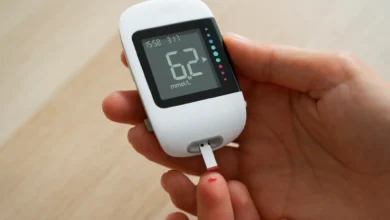The main key to recovering from diabetes is reducing the level of insulin in the blood, as insulin hinders the burning of fat stored in the body to obtain energy. Considering that carbohydrates cause a rise in insulin in the blood compared to other nutrients, following a low-carbohydrate diet leads to reducing insulin and stimulating the burning of diabetes. Fats. In this article, learn about the role of insulin in preventing fat burning and the impact of this on patients with type 2 diabetes.
The role of insulin in the body
The pancreas secretes insulin after eating in order to control blood sugar levels . Eating foods rich in carbohydrates leads to a significant increase in insulin levels, as these foods are transformed inside the body into large amounts of glucose.
Insulin transports glucose from the blood into muscle and fat cells, to control blood sugar levels, but this leads to the ingested glucose being stored in the cells in the form of fat instead of using it as an energy source. This causes a feeling of hunger again and prompts the person to eat again.
Insulin is responsible for storing nutrients and preventing them from being used as energy sources. It is a structural hormone, as it stores nutrients by converting amino acids into protein, and converting carbohydrates into glycogen or fats that are stored within the body’s adipose tissue, leading to weight gain .
At the same time, insulin prevents the burning of body fat when the body needs energy. It prevents the decomposition of protein, fat, and carbohydrates stored in the body. Instead, it stimulates the feeling of hunger to obtain sources of glucose by eating food as a quick source of energy.
The role of insulin in fat storage
When insulin levels rise, it stops burning fat for fuel and stimulates the storage of incoming nutrients as fat. For this reason, as long as the diet is high in carbohydrates, the body will not have a chance to burn stored fat, making weight loss difficult, so limiting carbohydrate consumption through a low-carb diet stimulates increased fat burning and reduces fat storage.
Carbohydrate- rich foods are responsible for fluctuating glucose levels, and thus fluctuating insulin levels, which stimulates cravings for a rapid increase in energy by eating sugary and starchy foods, which quickly turn inside the body into glucose, which insulin stores in the form of fat .
How does insulin affect fat burning?
Both the process of synthesis and storage of fat within the body, and the process of burning fat in the body are sensitive to changes in the level of insulin in the blood, and one of the most important factors that lead to severe fluctuations in the level of insulin is eating foods rich in carbohydrates, as a slight decrease in insulin leads to increased burning. Fats immediately, while increasing insulin activates enzymes that convert glucose into fats.
Since low-carb diets significantly reduce insulin levels, they allow the body to utilize body fat as a source of energy. These diets stimulate the process of burning stored fat to obtain energy. This also contributes to improving the levels of cholesterol and other fats in the body, which reduces the risk of infection. With heart disease.
Stimulating the fat burning process during exercise
Controlling carbohydrate intake leads to adjusting insulin levels, allowing the body to use fats for energy, even during exercise, as fats provide the energy needed to perform physical activity. By following a low-carb diet, the body uses both the healthy fats that are eaten as well as the stored body fat for energy.
What about diabetics?
A low-carb diet is beneficial for diabetics as it contributes to:
- Maintaining blood sugar within the normal range.
- Reducing the feeling of hunger between meals.
- Increase the burning of stored fat .
- Reducing insulin resistance .
- Achieve weight loss
Maintaining blood sugar
There are three nutrients that provide energy:
- Carbohydrates.
- Protein.
- Fats.
Among these nutrients, carbohydrates have the greatest effect in raising blood glucose levels, followed by protein, which has a small to moderate effect on blood sugar, then fats have the least effect among the three nutrients.
Carbohydrates contribute to raising blood sugar significantly, and protein and fat can also raise it, but to a much lesser extent than carbohydrates. Therefore, the healthy diet suitable for diabetics is a low-carbohydrate diet that includes a moderate percentage of protein and is rich in healthy fats.
Reducing the feeling of hunger
Following a healthy, low-carb diet is useful in reducing the feeling of hunger, as high-carbohydrate diets lead to severe fluctuations in blood sugar levels , and high and low sugar levels lead to a feeling of hunger, so it is best to stick to a diet that leads to more stable sugar levels.
The benefit of following a low-carb diet in reducing the feeling of hunger between meals is that it contains vegetables that provide the nutrients and vitamins that the body needs, and it also contains healthy fats , which are a good source of energy as they gradually supply the body with the energy it needs.
Reducing insulin resistance
Carbohydrates raise blood sugar levels, and this stimulates increased insulin secretion. Carbohydrates require a larger amount of insulin, and very high levels of insulin in the body lead to insulin resistance, leading to prediabetes, followed by type 2 diabetes.
Prediabetes and type 2 diabetes can be reversed by reducing insulin resistance. This can be achieved by reducing carbohydrates, which reduces the amount of insulin in the body, and this works to reduce insulin resistance .
High insulin levels are the reason behind weight gain in many people with type 2 diabetes, given that the main role of insulin is to store fat in the body.
Achieve weight loss
The main key to losing weight is to achieve lower insulin levels and follow a low-carbohydrate diet, given that a high-carbohydrate diet leads to high blood sugar, high insulin and thus fat storage and weight gain .
The diet allows you to maintain a normal eating schedule while maintaining insulin levels and thus fat storage becomes low. It is important to maintain physical activity as well because this will further help lower sugar levels and burn body fat .

 Is it possible to recover diabetes?
Is it possible to recover diabetes? Types of diabetes
Types of diabetes Insulin resistance, prediabetes, diabetes, what is the difference between them?
Insulin resistance, prediabetes, diabetes, what is the difference between them? How diabetes causes high cholesterol
How diabetes causes high cholesterol